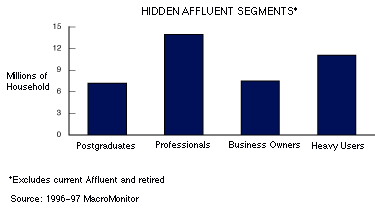The Hidden Affluent MacroMonitor Marketing Report Vol. III, No. 5 November 1997
In targeting the Affluent market, financial providers may need to extend their reach beyond those households that currently have the requisite income or assets. Including households that have not (yet) made the affluent cutoff but, nonetheless, exhibit potential Affluent indicators presents viable marketing opportunities. The "Hidden Affluent" report identifies and profiles four market segments that should be considered affluent because they share characteristics with the rest of the identified Affluent households, but were not included in the Affluent MacroMonitor segmentation because they did not have sufficient income or assets.

Each of the Hidden Affluent groups represents households that have a great potential for becoming affluent in the near future. Postgraduates could easily convert higher education into greater income, especially in an economy where a shortage of skilled labor exists. Professionals, with their typically high-paying careers, represent those households that may experience a temporary downturn that could change or that are in the nascent stage before the realization of higher incomes. The same could be true of Business Owners whose business may be in a temporary downturn or in the early stages before income or assets become significant. Last, the Heavy Users represent those households for which the velocity of money—along with the sophistication inherent in using more institutions, products, and services—suggests that they have the potential for becoming affluent once they pay their debts and begin to amass assets.
This discerning, educated, potentially affluent population differs considerably in its goals, motivations, and preferences. By identifying households that are affluent in their attitudes and needs—even if they have not achieved the requisite minimum level of income or assets—financial institutions can develop relationships with them now in their formative stages and inevitably profit from them when they become affluent.

Each of the Hidden Affluent groups represents households that have a great potential for becoming affluent in the near future. Postgraduates could easily convert higher education into greater income, especially in an economy where a shortage of skilled labor exists. Professionals, with their typically high-paying careers, represent those households that may experience a temporary downturn that could change or that are in the nascent stage before the realization of higher incomes. The same could be true of Business Owners whose business may be in a temporary downturn or in the early stages before income or assets become significant. Last, the Heavy Users represent those households for which the velocity of money—along with the sophistication inherent in using more institutions, products, and services—suggests that they have the potential for becoming affluent once they pay their debts and begin to amass assets.
This discerning, educated, potentially affluent population differs considerably in its goals, motivations, and preferences. By identifying households that are affluent in their attitudes and needs—even if they have not achieved the requisite minimum level of income or assets—financial institutions can develop relationships with them now in their formative stages and inevitably profit from them when they become affluent.